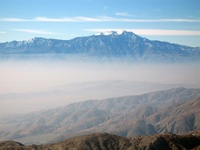China suffers from some of the worst air pollutions in the world. Two of its cities, Baoding and Xingtai, are in the top 10 for cities with the worst air pollution, according to the World Health Organization. (1) China’s smog causes a variety of health problems, and this year saw China’s Jiangsu province receive the country’s first ever red alert for smog. What are the causes of air pollution in China? It’s important to understand the causes of air pollution in China, so solutions to the problem can be devised.
Causes of air pollution in China
There are various causes of air pollution in China, but the main cause is the burning of fossil fuels, including coal. Coal burning is the biggest contributing factor to China’s smog problem, according to the Chinese Research Academy of Environmental Sciences.
“Emissions from coal burning plants in China’s most developed regions – Beijing, Hebei, and Tianjin - are five times China’s national average emissions. Much of China gets its energy from coal, and the burning of this coal produces particulate matter,” explains Kevin Wood, Camfil USA Vice President Sales & Marketing. “This particulate matter is responsible for turning the air into smog. These particles can reduce visibility, create acid rain, and damage people’s health.” (2)
The air in Beijing frequently hits 300 and above on the EPA’s air quality guide, representing the worst possible rating on the guide. The EPA recommends that for particulate pollution numbers above 200, those with heart or lung diseases should avoid all outdoor physical activity, and everyone else should stay away from heavy exertion. (3)
The problem of smog becomes even worse during the wintertime, as many rural families and urban communities use coal to keep warm during the winter. Beijing suffers from some of the worst smog, and the problem is compounded by being in a valley between the Xishan and Yanshan mountain regions. If a high-pressure system moves in, the air above the city can’t move over the nearby mountains, and just sits there becoming more polluted.
Health effects of air pollution in China
In terms of the health effects of air pollution in China, exposure to the polluted air in various Chinese cities can cause heart or lung conditions, and exacerbate symptoms in people who already have said conditions.
Particulate matter, particles which are smaller than 10 micrometers, can damage lungs and cause heart attacks. It can also kill people who have heart or lung diseases.
“Exposure to these tiny particles has been linked with lung cancer, and the World Health Organization reports that fine particulates are to blame in the 5% of deaths from lung cancer worldwide, or about 800,000 deaths annually,” says Wood. “Outdoor air pollution from coal burning and other sources causes the deaths of an estimated 1.6 million people in China every year, around 4400 people a day. Fine particles can also exacerbate asthma and cause difficulty breathing even in healthy people.’ (4)
Nanoparticles are particles which are smaller than 100 nanometers in size. Current research on the impact of nanoparticles on human health suggests they can even penetrate cell membranes and cause a range of health problems such as damage to the circulatory system and lungs.
Solutions to air pollution in China
What are some solutions to air pollution in China? Air pollution in China can be combated by reducing dependency on coal for manufacturing, energy, and heating. China has a five-year plan to reduce emissions and tighten their air pollution targets. The government will be limiting the emissions of tiny particulate matter from factories by 25%. The Chinese government will also be promoting electricity and natural gas in place of coal, and implementing control measures to deal with air pollution. China is investing in larger wind and solar power projects to cut down on emissions from coal and other fossil fuels. Coal plants are currently being shut down by the Chinese government, in favor of wind and solar power plants. (5)
“Beyond these steps, existing coal using facilities can install air scrubbers to reduce particulate emissions, residents can switch to alternatives for current coal stoves and furnaces, vehicle emission standards should be enforced, and higher-quality fuel can be used for diesel and gas vehicles,” says Wood. “Demand for continued economic growth is slowing down some of China’s anti-pollution efforts. However, if China is to clean up its air, it will have to find some way of implementing these policies despite pressure to continue rapid growth.” (6)
If you want more information on the hazards of air pollution, and steps you can take to cut back on your own emissions, visit Camfil and check out our excellent resources.
Lynne Laake
Camfil USA Air Filters
T: 888.599.6620,
F: Friend Camfil USA on Facebook
T: Follow Camfil USA on Twitter
Y: Watch Camfil Videos on YouTube
Sources:
http://www.bbc.co.uk/news/world-asia-china-35351597







